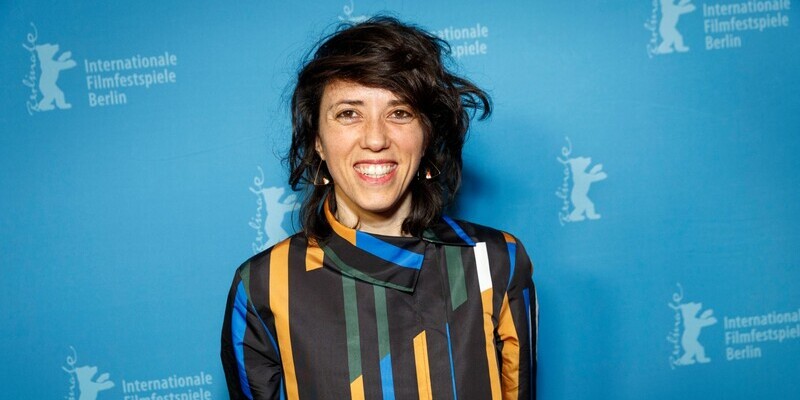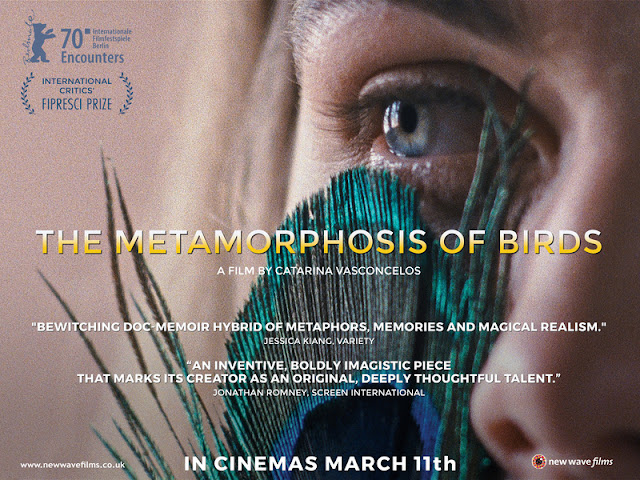
Interview by
Benjamin Poole

Hello Catarina. Congratulations on the release of
The Metamorphosis of Birds. It is one of the most wonderful films I have ever seen. When I was
writing a review of it, I found it quite challenging to convey the
experience of watching it in words! I wonder if you could provide an
overview of the film, please?
The Metamorphosis of Birds is a film with and about a
family. It is a film about mothers and how we survive and keep on going
when someone as important as a mother dies. It is a film that is like a
puzzle, made with images that come from paintings and from my family life.
It is a film that is made with voices that, sometimes, remind me of a
cantata. Many voices to narrate a story that, although comes from a very
personal environment, it is, unfortunately very comum: the death of a
mother. The death of the mother of our mother, of the mother of the mother
of our mother, of the mother of the mother of the mother of our mother.
What I find most striking about The Metamorphosis of Birds is
how it exploits the language of narrative cinema, but feels so unique,
so different and fresh. I am curious as to what your inspirations were
for the visuals of the film - were there any films or artefacts from
other mediums which you drew upon?
I didn’t study cinema. I come from fine arts and I think that you can’t
really run away from who you are. In this sense, in this film I’ve used as
inspiration and reference many of the paintings that were part of my
upbringing; paintings that always have fascinated me and that were so
strong in my life that, there were moments, I believed they belonged to
me.
I remember when I was living in London: I used to go quite often to the
National Gallery or to Tate Britain so that my eyes could enjoy some time
with Mister Turner. I developed this habit of going to see museums while
listening to music. It started at the National Gallery because it was
always crowded and it was hard for me to concentrate on what I saw. I
realised, little by little, that this was also my way of pretending that
those paintings I loved belonged to me: there were moments when I almost
forgot that there were hundreds of people in the museum's galleries. On
those moments, I took the opportunity to look at these paintings for a
long time, trying, somehow, for my brain to memorise them forever, so that
they would belong to me forever.
It's a very silly idea, I know. But I have always been moved by the way in
which the history of Western art develops. Just like a clock: if a piece
is missing, the clock stops working. The same thing happens with the
history of art. We only have realism because of the exaggeration of the
romanticism before; the renaissance only saw the light of day because of
the dark times that were the middle ages. I feel, therefore, that this
film also only exists because before me many artists, many painters, many
directors and writers and scientists and philosophers created and thought
about many things. This film wouldn't have happened without them all.
I am fascinated by how films get made, and the rapid changes we have
seen over the last half a decade in terms of production and
distribution. Would you mind talking a little about how
The Metamorphosis of Birds received funding and exhibition? What
were the challenges involved in selling such a distinctive film?
The Metamorphosis of Birds was very fortunate to receive a
production fund to be made. Portugal is a country that dedicates minimal
funds to culture: I was very fortunate to receive funding for this film
which, although it starts from a documentary basis, takes a path towards
essay and fiction. It was that state funding that allowed this movie to be
made, together with help of the various places where the film was shot (as
for instance the Ship NRP Sagres of the Portuguese Navy).
Films are not made with just one person and this film is no exception. The
film's production company, Primeira Idade, was fundamental on their belief
in the film, as was the team that was with me throughout the three years
where the film was shot. I believe as well that the fact that the film
premiered at the Berlinale was fundamental for the life it has had and for
reaching wider audiences.
On a personal note, I believe that cinema is a profoundly generous art
and, if we compare it to painting, it is very young and full of
elasticity. I feel that it was the generosity of cinema and the people I
worked with that allowed this film to take this format: a film that
swallowed a poem that swallowed a family where two mothers died.
The Metamorphosis of Birds is based on the history and
experiences of your own family. At one point, a character maintains,
"when you can’t remember, invent." As I watched it I wondered how much
of the narrative was ‘conjecture’, and how much was corroborated. My
question isn’t "how much did you make up?," but I am interested in how
you created a truth from what happened, what was remembered and what was
"invented."
It is very difficult to film the dead. Because the dead lodge in our
memories and our memories are anything but reliable. We spend years
improving them and inventing them so that we don't forget them. But there
are memories that were never given to us or that were simply lost: they
died with the dead. I felt, throughout this process, that my family
members tried to give me as much information as possible. But information
is sometimes not enough to summon the dead. Sometimes fiction is what
helps us get closer to reality. And to ghosts.
The Metamorphosis of Birds had a very profound effect on me (my
favourite line was when a character wishes for a "heart as tall as the
treetops so that, from afar, I can always follow the flight of my
children who are not afraid of the wind" - I’m moved just typing it!).
As an artist what do you hope people take away from your film?
Hope.
The Metamorphosis of Birds is in UK cinemas now.
